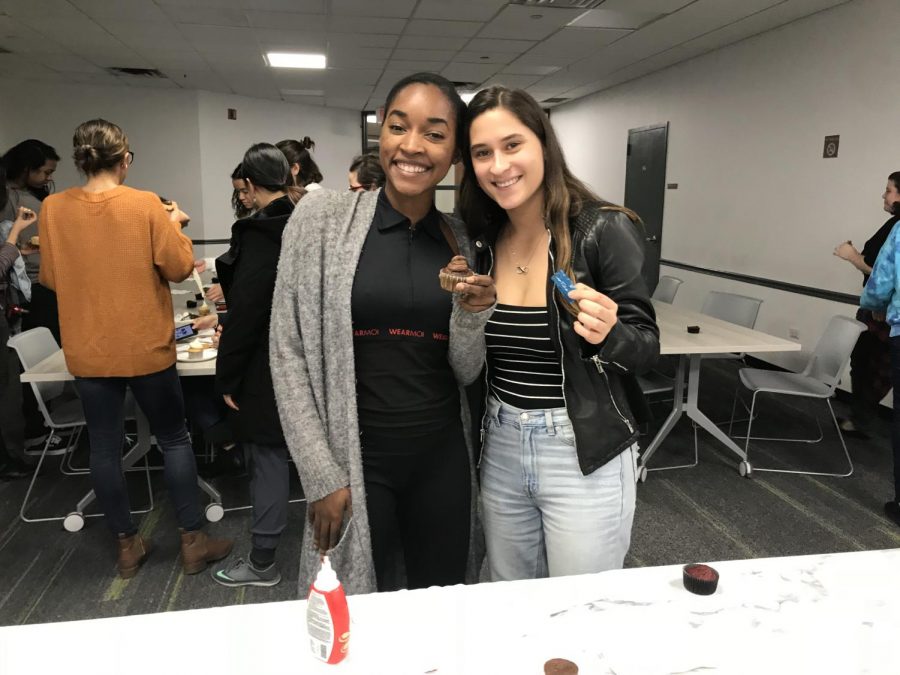Residence Hall Association Calls for Student Voices
The Residence Hall Association (RHA) seeks ways to ensure all student voices are heard. (YUNUEN CHO/THE OBSERVER)
October 24, 2018
On Sept. 26 at 9:30 p.m., students started to arrive at McMahon 109 for the year’s first Residence Hall Association (RHA) meeting, yet the door was still closed. Members of the e-board tried to hold the door open with a splintered wooden stop, but the stop kept slipping, barring entrance to the room. This problem extends to an existential challenge for RHA: What is the best way to ensure student voices are heard?
RHA President Minna Suh, Gabelli School of Business (GSB) ’20, reflected on the the organization’s mission. “The RHA is here for all students,” she said. “We want to be a voice for their concerns and needs.”
At the first meeting, two overheard comments summed up the night.
“I didn’t know there’d be pizza,” one attendee said.
“What is this about anyway?” another asked.
By the end of the night the executive board explained the purpose of RHA, their various initiatives for the year and their many services. Generally speaking, RHA covers issues on campus dealing with dorm buildings, residential life policies, dining facilities and campus events.
On a small scale (or maybe a large scale depending on one’s desire to see “A Star is Born”), RHA sells movie tickets for $11 and offers opportunities for students to purchase Broadway tickets through the Theater Thursday Raffle. RHA is also responsible for organizing community events on campus.
In terms of larger projects, RHA helps to support the B+ Foundation, which strives to end pediatric cancer. At Fordham, this means a year-long, campus-wide effort through various mentorship programs and fundraising events. Students can volunteer as “heroes” who spend time with children diagnosed with cancer. The fundraising efforts will top off with the Fordham Dance Marathon next semester.
Despite these other services, a primary concern for many is enacting change on residential policies. The Guest and Visitation Policy has been the primary focus of RHA’s efforts in recent years. The controversial policy currently restricts students from hosting overnight guests of the opposite sex. This fall, RHA and the Office of Residential Life reached a compromise which curbed the zero-tolerance policy violation fee, though many students still feel that other aspects need to change.
For any sort of change to occur, RHA needs students’ voices, Suh said. “The more evidence, the better.”
On that first meeting, in a packed room, voices were powerful. At the second meeting two weeks later, however, the turnout was less hopeful. No pizza was promised. Only nine students attended. Attendees went around the room and shared the screensavers on their phones as an icebreaker while waiting for other students who never arrived. The highlights included a grandma in a rocking chair, a boyfriend still sleeping and a cheeky cat.
The new Advocacy Coordinator Vasilios Livanos, GSB ’21, addressed his goals for the year: continue working with the university towards a guest policy regulation revision. Livanos’ job as an advocacy coordinator is to facilitate a conversation between the student body and the Fordham administration. RHA wants to work with Fordham, Livanos said, rather than against them.
Katie Gleason, Fordham College at Lincoln Center (FCLC) ’22, believes that “a reasonable compromise makes sense, but I don’t know if the students and the administration have the same definition for what a reasonable compromise would be.”
In an email sent to the student body on Oct. 4, RHA stated: “Our Advocacy Coordinator will be continuing work with our advocacy representatives to make progress on our Guest Pass Policy Initiative and other important matters.”
Livanos declined to comment further on the policy.
At the end of the meeting, the e-board took questions from the attendees. When asked how the student body should go about enacting change, the board answered plainly: more presence at the general body meetings.
There were no further questions. There were no further comments. The meeting lasted less than 10 minutes.
If students cannot attend the Wednesday meetings, there are suggestion boxes posted in the McKeon Hall laundry room and in McMahon Hall outside of the RHA office. Additionally, an anonymous digital suggestion form is available through email.
At the first meeting, during a pause, a student raised their hand and asked, “Has anyone ever thought about putting printers in the res hall?”
A chorus of applause followed. “We can put that on the agenda,” Suh said with a smile.












